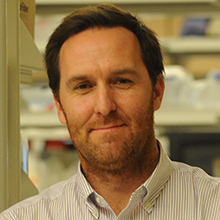Paul DeCaen, Ion Channels to Treat Polycystic Kidney Disease
 For those with autosomal dominant polycystic kidney disease (ADPKD), the globe’s most common kidney disorder, the present-day prognosis remains particularly bleak.
For those with autosomal dominant polycystic kidney disease (ADPKD), the globe’s most common kidney disorder, the present-day prognosis remains particularly bleak.
Those with the inherited disorder typically develop cysts on their kidneys in their 30s or 40s. For those with the most severe cases of this incurable disease, the kidneys enlarge and gradually lose function. By their 50th birthday, many with ADPKD face renal failure, staring at dialysis or a kidney transplant for survival.
With his pioneering research into kidney ion channels, however, Paul DeCaen is close to unlocking the door to a potential alternative: early therapeutic intervention that prevents the cysts from even forming. In June 2020, a DeCaen-led study published in the Proceedings of the National Academy of Sciences detailed the molecular mechanisms behind the development of ADPKD.
“Having determined a structural blueprint of the broken ion channel, the hope is that we can help those with the disease live less painful and more normal lives for longer,” said DeCaen, an assistant professor of Pharmacology at the Northwestern University Feinberg School of Medicine.
Ion channels, thousands of which exist in the human body, are proteins in the membranes of cells responsible for driving electrical currents within the body. When the channels get mutated and a small, yet essential piece of the structural assembly fails to work properly, debilitating conditions such as ADPKD and neuropathic pain result.
The first steps in DeCaen’s groundbreaking work include exploring how mutations cause a channel structure to change and, later, how those changes alter function. The final step, and admittedly the most difficult, addresses medication’s role in correcting the mutated channel to enable proper functioning.
Using direct electrophysiology, state-of-the-art microscopes and various biochemistry and molecular biology instruments alongside genetic tools, DeCaen gains vast amounts of information to understand ion function. Such precision, he said, spurs more informed, targeted therapeutic design as opposed to a long series of trial-and-error screenings.
Long term, this work can produce more targeted, effective therapeutics and a greater understanding of genomes.
“These are true game changers that open the door for more personalized medicine,” DeCaen said. “We can prescribe specific drugs to a patient to achieve the greatest efficacy while also avoiding side effects in a specific individual.”
Beyond ADPKD, DeCaen’s work with ion channels also includes detailing sodium ions tied to potentially fatal conditions such as epilepsy and cardiac arrhythmias. Recently, DeCaen and colleagues determined several high-resolution structures of sodium channels bound to drugs used in the clinic.
“For pharmacology, you need to know what your target really looks like in order to develop a drug that will fit its shape,” said DeCaen, who was initially trained as an ion channel pharmacologist at pharmaceutical giant Pfizer. “It’s a critical step toward developing effective interventions and having the structure in hand brings us that much closer.”
DeCaen’s research has been supported by funding from a diverse array of sources, including the National Institutes of Health, the PKD Foundation, the Mayo Clinic and the American Society of Nephrology.
“If we can continue making progress in our research, there will be a real tangible impact to people’s lives,” DeCaen said. “It’s that potential for direct translation that motivates and energizes our work in the lab.”
DeCaen was recently selected to partner with Lakeside Discovery to identify new therapies for ADPKD.